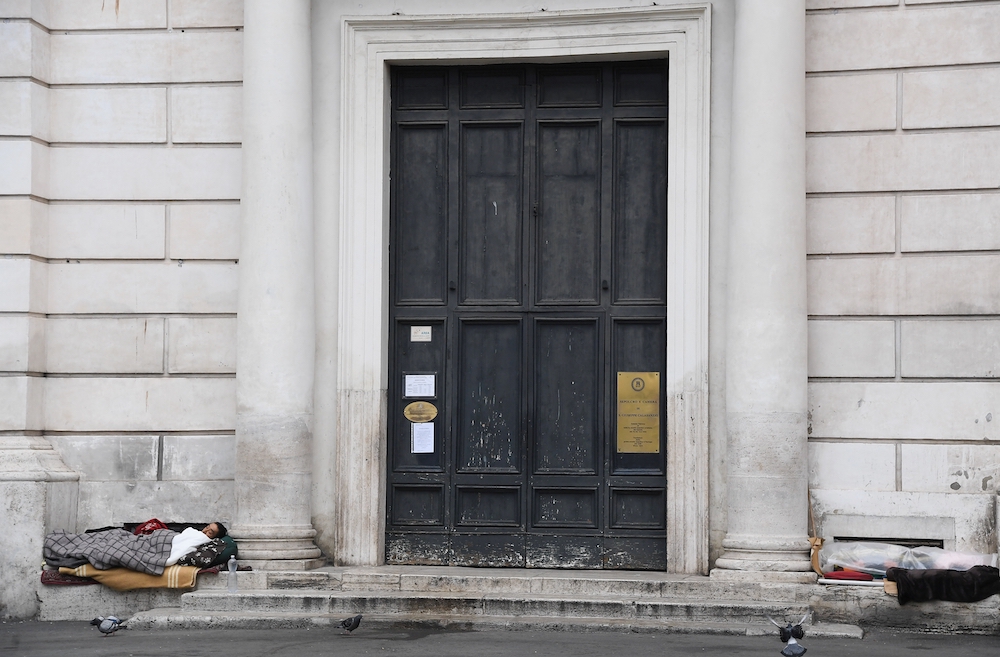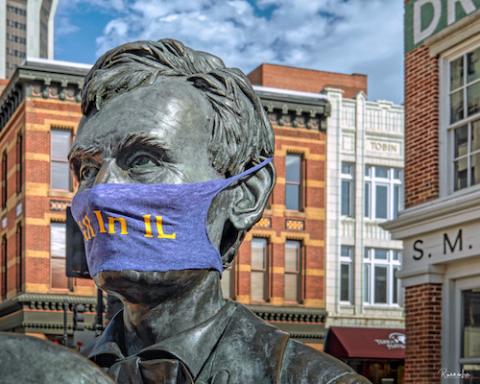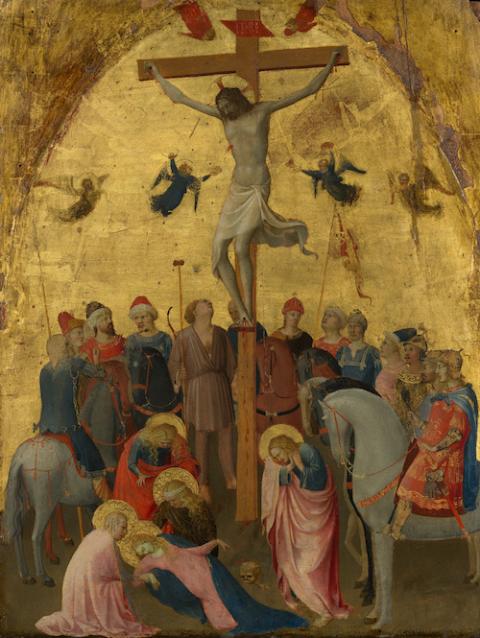
People who are homeless sleep in front of a closed church in Rome March 13, after an unprecedented lockdown across all Italy imposed to slow the outbreak of the coronavirus. (CNS/Reuters/Alberto Lingria)
In March, Msgr. Charles Pope, a pastor in Washington, D.C., wrote a piece for the National Catholic Register condemning the closing of churches in Rome due to the COVID-19 pandemic. He concluded:
Let's take reasonable precautions. Wash your hands; avoid touching your face; respect that some do not want to shake hands just now. But above all, do not be afraid and think that God is no longer in control. Go to Mass and trust God! Now is the time for faith, not an unwise abandonment of the liturgy which remains our help for salvation in a sin-soaked and unholy world. Run to God! Do not run from him and his sacraments.
"Go to Mass and trust in God" sounds like ordinary pastoral counsel. Saying "God is in control" sounds like ordinary piety. But such statements, when set in opposition to life-saving public health measures, border on providentialism: the belief that everything that happens is willed and caused by God. This belief has, historically, been associated with movements of oppression; it can be psychologically harmful to those who do not enjoy life's material advantages.
Nonetheless, views such as those expressed by Msgr. Pope are not unusual. Pro-life activist and recent RNC speaker Abby Johnson wrote on her Facebook page that closing the churches because of the virus was "the most cowardly thing" she could think of. "People literally died for our faith" Johnson wrote. "What a bunch of wimps." She added, "I would NEVER stay away from the Eucharist, because of this, unless my family was sick. We don't close churches during flu season. Churches are a place of healing."
Some have suggested that caution in the face of the pandemic indicates fear and a failure of faith. In a homily on August 23, in Holy Family parish in Steubenville Ohio, Deacon Ralph Poyo preached, "The rest of the world is living in fear, the rest of the world is going and hiding in quarantine, the rest of the world is afraid to get close to each other, the rest of the world believes that if you get COVID you're gonna die."
Poyo went on to ask, in persona Christi: "Do you believe that I died, and that I rose from the dead and that I conquered sin and death? Because if you believe that surely you believe that I have the power to do anything. Surely if you believe that you understand that you will not live one day longer or one day less than I the Lord deem it."
Advertisement
One parishioner, Samantha Motto, who witnessed the homily, said that her initial response was anger. "For the last 6 months I've been making sacrifices in order to love my neighbor and to protect the vulnerable... and you're telling me that makes me a bad Christian?"
Motto was concerned about the effect of such ideas on her faith community:
He went way into the deep end of providentialism and solo fide nonsense that was irresponsible. I know for a fact that there are people in this community who truly believe that their faithfulness will protect them from COVID, and nothing else. Deacon Poyo poured gasoline onto that particular fire of insanity, in a way that was uncharitable to our more vulnerable population and offensive to me.
But others had no problems with the homily. And this is unsurprising: Providentialism has deep roots in Christianity in the United States. The belief originated in John Calvin's notions about divine sovereignty and was brought to the North American continent in the 17th century by Puritan colonizers, believing they were chosen by God to settle the "New World." Claiming their "promised land," they drew explicit comparisons between themselves and ancient Israel.
Providentialism was influential through many epochs in the Americas. It provided a justification for European colonialism, imperialism and domination of indigenous peoples. Similarly, Christians in North America defended the Revolutionary War with invocations of God's will. Later this same belief would find a new form in "manifest destiny," the conviction that the western expansion of the United States was ordained by God, and thus inevitable.
Yet the role of providentialism was not always negative. It influenced the Abolitionism movement, for instance. President Abraham Lincoln and Julia Ward Howe believed slavery was contrary to God's plan for the nation.* Rhetoric drawn from providentialism can be found in Howe's "Battle Hymn of the Republic," which portrays God as being on the side of the Union Army, his "righteous sentence" visible by the "dim and flaring lamps" of the encamped troops. In his second inaugural address, Lincoln raises the possibility of slavery being "one of those offences which, in the providence of God, must needs come, but which, having continued through His appointed time, He now wills to remove."

Statue of President Abraham Lincoln with "All in Illinois" mask, Springfield Old State Capitol Plaza, April 8 (Flickr/Randy von Liski)
Anyone who has experienced evangelical Protestantism has likely encountered providentialism today. It is especially influential in the Quiverfull movement, which opposes any efforts to regulate birth or family size, believing reproductive processes are dictated by God.
I have seen first-hand the forms providentialism takes — and the damage it does. My family was involved in several loosely-knit communities that fostered an extreme form of this belief. It was common for people to eschew medical care in favor of the "laying on of hands"— often termed "faith healings." Several family friends died having never sought proper medical care, or having sought it too late.
For those who were not healed, there were ways of explaining why. It wasn't God's will, some would say. Or perhaps their faith had been too weak.
When we became Catholic, many things changed, but my family's reliance on divine providence became even more radical. We lived off the land, usually with no income, relying on the generosity of others, often residing and laboring on other people's property. My father's vision for life was based, literally, on a line from the Gospel, Matthew 6:33: "But seek ye first the kingdom of God, and his righteousness; and all these things shall be added unto you."
My experiences may seem extreme, but in a sense our lifestyle was the logical application of a widespread Christian belief.
Providentialism is not a Catholic idea, however. The church does not teach that everything that happens is due to divine mandate, nor that we should leave health, reproduction and material well-being completely in God's hands. Rather, it teaches that God grants his creatures free will, which they can use to make choices that are not a part of God's design. As the Catechism of the Catholic Church states:
Angels and men, as intelligent and free creatures, have to journey toward their ultimate destinies by their free choice and preferential love. They can therefore go astray. Indeed, they have sinned. Thus has moral evil, incommensurably more harmful than physical evil, entered the world. God is in no way, directly or indirectly, the cause of moral evil. He permits it, however, because he respects the freedom of his creatures and, mysteriously, knows how to derive good from it …
So, across the globe, the church's response to the pandemic has been to take precautions, including dispensing the faithful from the Sunday Mass obligation. The wave of providentialist unrest in the face of these precautions betrays a perspective on divine will and human reason that is not theologically sound or helpful.

Detail of painting "The Crucifixion" by Fra Angelico (Guido di Pietro), circa 1420-23 (Metropolitan Museum of Art)
But this type of thinking has percolated in Catholic circles for a while. Couples who opt to use natural family planning (or NFP), and find it difficult or damaging, are often admonished for failure of faith — just as Deacon Poyo accused those who have been taking precautions of "living in fear."
One woman who had this kind of negative experience of providentialism was Veronica Roltgen.
"[M]y mother was very vocal about her position against NFP. Her reasoning was that God should be in complete control of a couple's family size. She insisted that God would decide when a couple was ready for another family member, and they should just trust God. Thus, my parents had nine children and numerous miscarriages."
Roltgen is only one of many women whose struggles to obey the magisterial prohibition on contraception have been made harder by authority figures questioning their faith. The implication is, again, of a radical divide between "us" (the faithful) and "the world" (the faithless).
But the real divide, when it comes to who feels materially secure in divine providence, is not between faithful and faithless. It is between privileged and marginalized. Ideas such as "God will never give you more than you can handle" or "whenever God closes a door, he opens a window" only make sense if they are never put to the test by real hardship. In a culture where we have not faced, firsthand, the horrors of war, famine or genocide, these ideas get traction — but only up to a point. This nation, too, knows poverty, starvation, homelessness, violence, abuse and despair. Those who are subjected repeatedly to racial injustice might see providentialism as just another instance of white privilege: Those who enjoy such privilege might prefer to ascribe it to divine benevolence, rather than confront their own role in a culture of radical inequality.
Assenting to providentialism means assenting to the proposition that extreme suffering and injustice happen not simply because God has "permitted" it but because he willed it, and made it happen, as part of his master plan. How could anyone believe in a loving God within such a theological framework? How could belief in God be a comfort?
Yet the dangers of providentialism should not mean rejecting trust in God. We need to replace cheap providentialism with the kind of faith that can endure outside the realm of "first world problems." It helps to look to the spirituality of those who have endured extreme suffering and injustice.
In the Christian tradition this should be obvious. Central to our iconography is Christ crucified, suffering with his creation. This image should not be used to glorify or to excuse suffering, but to reiterate that God is enduring it with us.
For examples of faith that can stand the test of hardship, we have the early church martyrs. We have the theology of Black Christianity. Judaism also has drawn on an idea of a "suffering God," as a way of dealing with "theology after Auschwitz." The Shoah presents an especially somber challenge to the idea of divine control of human history, and while some thinkers have written profoundly of an absence of God, Jewish theologians such as Hans Jonas offer an alternative perspective, in which God is not aloof from, but rather suffers with creation.
Insights can be found, also, in the writings of the mystics. Julian of Norwich, in Revelations of Divine Love, shares her vision of God's providence for all creation:
At the same time, our Lord showed me, in a spiritual manner, how intimately he loves us. I saw that he is everything that is good and supports us. He clothes us in his love, envelops us and embraces us. He wraps us round in his tender love and he will never abandon us. As I understand it, he is everything that is good. He also showed me a tiny thing in the palm of my hand, the size of a hazelnut. I looked at this with the eye of my soul and thought: "What is this?" And this is the answer that came to me:
"It is all that is made."
I was astonished that it managed to survive: it was so small that I thought that it might disintegrate. And in my mind I heard this answer:
"It lives on and will live on forever because God loves it."
Julian offers a vision of God not as a gamemaster, moving pieces around, but as enfolding us and enclosing us, sustaining us in being. This is both more theologically accurate and more personally consoling.
Radical providentialism might be comforting for those who, enjoying prosperity, believe they are guaranteed to keep it. But just as, in our social justice, Catholicism has a preferential option for the poor, I believe that our theology should have a preferential option for the suffering. Theological ideas that only hold up in a context of privilege should have no place in Christian communities.
[Rebecca Bratten Weiss is an editor, independent academic, and freelance writer residing in rural Ohio.]
*This sentence has been updated from its original version.








